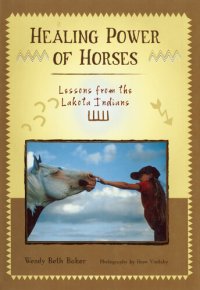
Ebook: Healing Power of Horses: Lessons from the Lakota Indians
Author: Wendy Beth Baker
- Tags: Pets, Nonfiction, PET006000
- Year: 2012
- Publisher: CompanionHouse Books
- Language: English
- epub
Wendy Beth Baker's The Healing Power of Horses is devoted to the world's greatest horsepeople, the Oglala Lakota Indians of Pine Ridge, South Dakota. She begins the book by sharing the philosophy of these great horse-loving people: “There are those who feel the sun rises and sets on the back of a horse, and no matter what obstacles life sets in their way, they never dismount." The spirit and fortitude of the Lakota Indians inform Baker's words as she describes how this once-nomadic tribe came to view the horse as sacred and assigned it great significance in their culture, religion, and lifestyle. The Indians who live on the Pine Ridge Reservation have grown spiritually and as a community through their relationship with their horses, and it is through this connection to the natural world that the power of healing and ultimately, health, flows.
With photography by Hope Vinitsky, The Healing Power of Horses tells the individual stories of over a dozen Lakota Indians and how horses have affected each of their lives. Baker was able to interview each of these inspiring individuals for inclusion in this book. The empowering stories told come from Wayne Waters, Marlin “Moon" Weston, Eugenio White Hawk, Wendell Yellow Bull, Aldeen Twiss, Phillip Jumping Eagle and Billy, Dale Vocu, Emma and Shelly Waters, Wilmer Mesteth, Vernell White Thunder, Pat Heathershaw, Lester Waters, and the Carlows. While the stories of each of these exceptional men and women are different, the common denominator in each is the horse's transformative power to heal their minds, spirits, and bodies. These are stories of artists, athletes, and common noble folk, all of whom have struggled to overcome life's many obstacles to thrive and become better people.
The author's intention in this book, as she describes in the final section “The Future of the Lakota Horsepeople," is to have her readers gain a better understanding of horses in Lakota culture while at the same time affording some of the Lakota people an opportunity to reconnect with their cultural identity. In reading this book, it is clear that the Lakota people have preserved the emotional power of their ancient culture and strength as a people by maintaining their connection to horses, animals that they deeply love. Fiercely loyal to the United States, the Lakota horsepeople are a strong, proud, and brave community who have much to teach all people about life and the pursuit of healing.